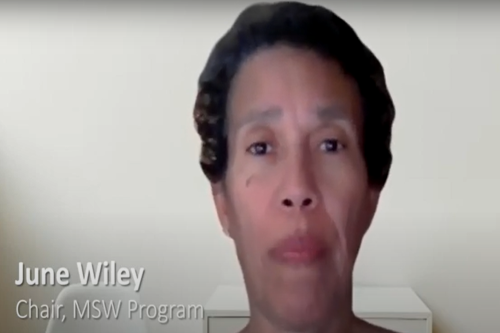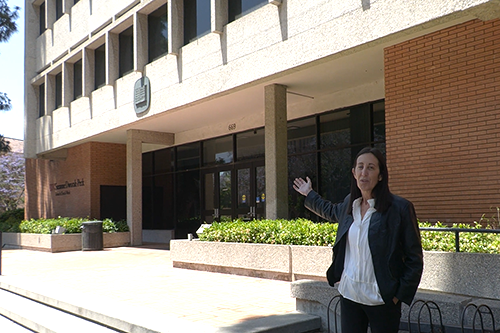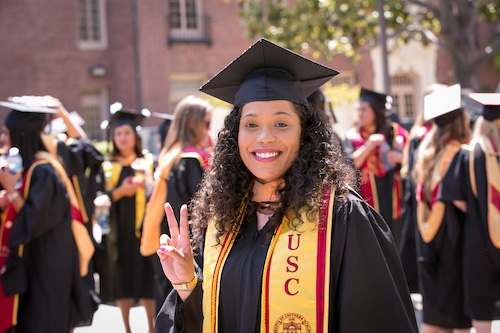Curriculum
New and emerging challenges in the 21st century demand a different kind of social worker.
The USC Suzanne Dworak-Peck School of Social Work curriculum is designed to produce highly-skilled social workers that are fully prepared to find solutions that will address the pressing issues of today... and be proactive in problem-solving for tomorrow. Students need to feel confident when they graduate that they have the knowledge, skills and vision necessary to embark on successful social work careers.
Our courses and training incorporate evidence-based and evidence-informed research and practices, including new findings in future-forward areas such as artificial intelligence and neuroscience that are pushing the envelope in prevention and intervention and providing more interdisciplinary opportunities for social workers.
Be a part of the next generation of change-makers. It all starts here.
Rigorous Coursework
The Master of Social Work degree requires 48 units of course work. The program of study leads to the Master of Social Work (MSW) degree with a specialization in an area of advanced practice. Course requirements are organized into a generalist curriculum and a specialized practice curriculum.
The generalist curriculum provides students with knowledge, values, skills, and cognitive and affective processes that prepare them for professional practice with individuals, families, groups, organizations, and communities.
The specialized practice curriculum involves:
- integration of social work knowledge, values, skills, and cognitive and affective processes
- demonstrated ability to engage, assess, intervene, and evaluate across or within client populations' problems areas, and
- methods of intervention.

June Wiley, associate teaching professor, provides comprehensive details on the new curriculum beginning in fall 2022.
PLAY VIDEO
Track Options
MSW students also have the option to pursue specialized training along one of the following tracks based on client populations, settings or systems:
- Adult Mental Health & Wellness
- Children, Youth and Families
- Social Change and Innovation
- School and Educational Settings
- Military Populations and Settings
Practicum
Practicum education is essential for social work training, spanning four semesters and integrating community-based placements, classroom instruction, and simulated client training. The school partners with various community agencies and organizations to offer students practical experience that complements their academic learning. Practicum instructors, who are MSWs from either the agency or the school, supervise and teach the students during their placements. Practicum settings are intended to provide a broad range of experiences that assist in the integration of concepts and enhance the workforce. Campus based students are provided two diverse community based placements. These placements, often located in diverse social service agencies, are chosen for their professional quality, commitment to social justice, and ability to support educational goals.
By contrast, online students begin their practicum education with the Virtual Practicum (VFP), which is an online experience that allows students to hone in on practice skills and gain confidence in a controlled secure environment. The Virtual Practicum is 210 hours and take place in the MSW’s intimate virtual classroom. While in a small group session and under the supervision of a USC professor, students have an opportunity to work with an actor who plays the role of a client in crisis, in real time! This gives students the opportunity to perfect their craft right out of the gate. Once students have established a foundation online, they will complete an in-person, community-based placement that will develop your clinical skills and prepare them to work in a range of settings for a total of 890 hours. By end of the program, both students online and on campus will have completed a total of 1200 hours, 1100 hours during the practicum, and 100 hours during seminar hours.
Download Practicum Education Manual (PDF)
Learning Options
Our MSW program offers in-person, online, and hybrid learning options to accommodate student preferences. In-person learning provides synchronous learning, immediate feedback, and access to campus resources. Online learning offers flexibility, asynchronous and synchronous learning, and diverse interactions. Hybrid learning combines the best of both, providing structured in-person courses in the first year and flexible online courses in the second year, ensuring a balanced and varied learning experience. Each format is designed to cater to different learning styles and life circumstances, ensuring that all students can achieve their educational goals effectively.
Which One Is Right for You?
On Campus
- Learn face-to-face with peers and renowned faculty
- Synchronous learning
- Full- and part-time options
- Day and evening classes
- Advanced Standing available
Hybrid
- Flexible format to earn your degree
- First year on campus, second year online
- Full- and part-time options
- Day, evening and weekend classes
- Advanced Standing available
Your On-Campus Options

Get to know the faculty that will help you become part of the next generation of changemakers.
How Can I Learn More About the MSW?

Ready to chart a new path forward? View steps to apply or start your application to our world class MSW today.